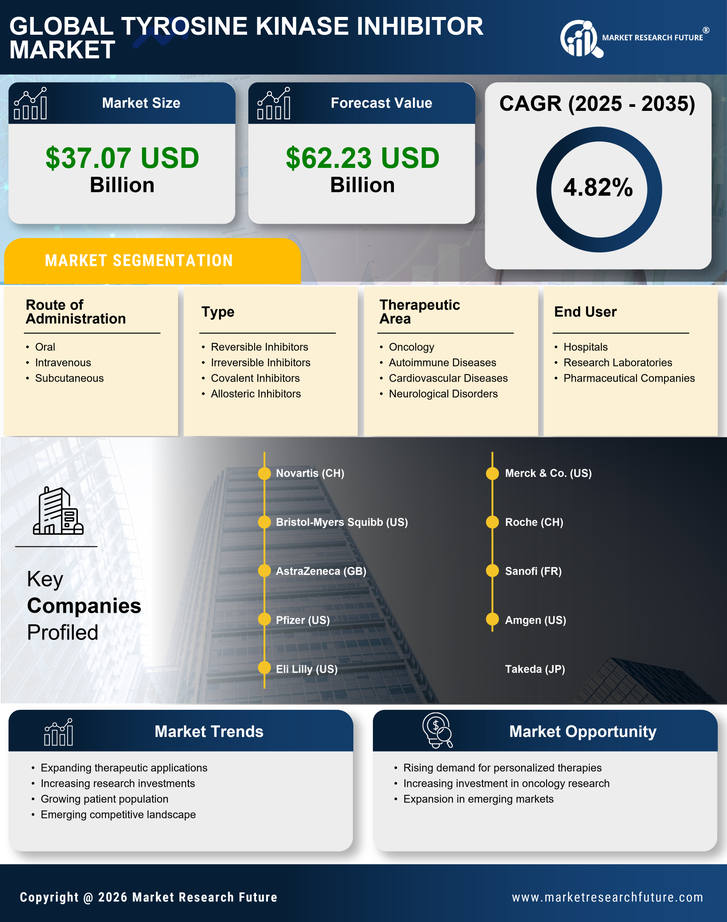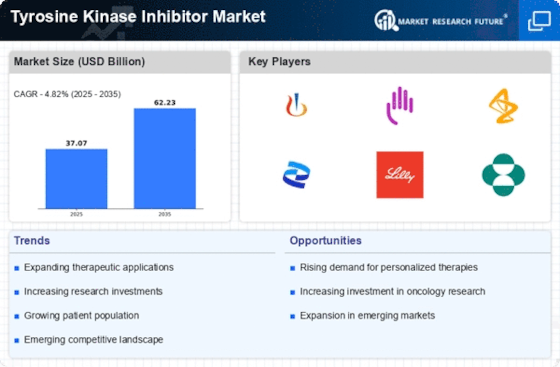Growing Incidence of Cancer
The rising incidence of cancer worldwide is a primary driver for the Tyrosine Kinase Inhibitor Market. As cancer cases continue to escalate, the demand for effective treatment options increases correspondingly. According to recent statistics, cancer is projected to affect millions of individuals annually, necessitating innovative therapies. Tyrosine kinase inhibitors, known for their targeted action against specific cancer types, are becoming increasingly vital in treatment regimens. This trend is likely to propel the market forward, as healthcare providers seek to incorporate these inhibitors into standard care protocols. Furthermore, the increasing awareness of cancer screening and early detection is expected to contribute to the growth of the Tyrosine Kinase Inhibitor Market, as more patients are diagnosed and treated with these advanced therapies.
Advancements in Drug Development
Technological advancements in drug development are significantly influencing the Tyrosine Kinase Inhibitor Market. The integration of cutting-edge technologies, such as artificial intelligence and machine learning, is streamlining the drug discovery process. These innovations enable researchers to identify potential drug candidates more efficiently, reducing the time and cost associated with bringing new therapies to market. In recent years, several tyrosine kinase inhibitors have received regulatory approval, reflecting the success of these advancements. The market is expected to witness a surge in new product launches, as pharmaceutical companies invest heavily in research and development. This influx of novel therapies is likely to enhance treatment options for patients and drive the growth of the Tyrosine Kinase Inhibitor Market.
Rising Demand for Targeted Therapies
The growing preference for targeted therapies among healthcare providers and patients is significantly shaping the Tyrosine Kinase Inhibitor Market. Targeted therapies, including tyrosine kinase inhibitors, offer a more personalized approach to cancer treatment, focusing on specific molecular targets associated with tumor growth. This shift towards precision medicine is driven by the desire for improved treatment outcomes and reduced side effects. As patients become more informed about their treatment options, the demand for these innovative therapies is likely to increase. Additionally, healthcare professionals are increasingly advocating for the use of targeted therapies, further propelling the Tyrosine Kinase Inhibitor Market. The trend towards personalized medicine is expected to continue, fostering the development and adoption of tyrosine kinase inhibitors in clinical practice.
Increasing Investment in Oncology Research
The surge in investment directed towards oncology research is a crucial driver for the Tyrosine Kinase Inhibitor Market. Governments and private entities are recognizing the urgent need to combat cancer, leading to increased funding for research initiatives. This financial support is facilitating the exploration of new therapeutic targets, including tyrosine kinases, which play a pivotal role in cancer progression. As a result, numerous clinical trials are underway, evaluating the efficacy of various tyrosine kinase inhibitors. The outcomes of these studies are anticipated to expand the therapeutic landscape, potentially leading to new treatment options for patients. Consequently, the heightened focus on oncology research is expected to bolster the Tyrosine Kinase Inhibitor Market, as more effective therapies become available.
Regulatory Support for Innovative Therapies
Regulatory bodies are increasingly supportive of innovative therapies, which is positively impacting the Tyrosine Kinase Inhibitor Market. Streamlined approval processes and incentives for the development of novel cancer treatments are encouraging pharmaceutical companies to invest in research and development. Recent regulatory initiatives have aimed to expedite the review of promising therapies, including tyrosine kinase inhibitors, thereby facilitating quicker access for patients. This supportive regulatory environment is likely to enhance the market landscape, as more companies are motivated to bring their innovative products to market. Furthermore, the collaboration between regulatory agencies and industry stakeholders is fostering a culture of innovation, which is expected to drive the growth of the Tyrosine Kinase Inhibitor Market in the coming years.


















